
The goal of the Mecklenburg County Sheriff’s Office Adult Programs Department is to provide the residents housed in the Mecklenburg County Sheriff’s Office detention facilities the opportunity to address those issues that may have contributed to their criminal behavior and subsequent incarceration.
The mission of the Mecklenburg County Sheriff’s Office Adult Programs Department is to make our community safer by offering a broad array of relevant services that provide those we serve with opportunities for positive change.
MAINTAIN A SAFE AND SECURE ENVIRONMENT
- Provide a structured and consistent environment
- Provide well trained motivated staff who believe change is possible
- Reduce disciplinary infractions
MAINTAIN A SYSTEM ENCOURAGING EDUCATION AND SKILL DEVELOPMENT
- Provide opportunities for personal growth through structure and skill development
- Administer appropriate assessments to determine educational and skill levels
- Identify strengths while building individual skills and natural supports
- Support resident’s development of individual goals
ENCOURAGE RESPONSIBILITY FOR BEHAVIOR AND CHOICES
- Reduce individual recidivism
- Create an atmosphere for positive peer supports
- Provide opportunities to experience success and leadership
- Promote critical thinking/reasoning skills
- Recognize achievements and progress toward individual goals
POSITIVE CHANGE FOR THE BETTERMENT OF THE RESIDENT AND THE COMMUNITY
- Provide community linkage through advanced planning
- Promote personal achievement and leadership skills
- Create a team-work atmosphere
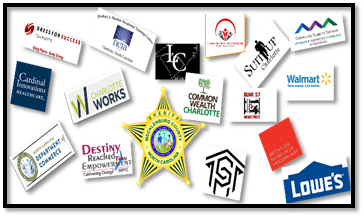
Through reentry program participation, residents acquire new skills and are linked to various community resources and organizations that prepare them for successful transition into the community.
Commitment to Change: a two-week program designed to address criminogenic risk factors leading to arrest, detention, and rearrests. This is an evidence-based curriculum that focuses on the successful application of cognitive behavioral theory (CBT). Participants consider how their thinking has impacted their lives and how to harness this reality into life change.
Emotional Intelligence: A one-week program where participants learn the theory of emotional intelligence developed by Daniel Goleman that encompasses the connection between self-awareness, self-management, social awareness, and relationship management. This program focuses on skills development where participants understand how to improve their understanding of themselves and others, leading to improved personal and work relationships.
Courage to Change: a six-week evidence-based journaling program provided to participants in preparation for entering the community after incarceration. The Courage to Change® program encompasses topics such as Self Control, Responsible Thinking, Social Values, Family Ties, Peer Relationships and Skills for Successful Living.
Anger Management: a two-week psycho-therapeutic program for anger prevention and control where participants learn how to reduce both emotional and psychological responses to anger. This program provides residents with information on anger and the necessary tools to recognize, diffuse, and control anger before it results in negative behavior.
Bridges Out of Poverty: Participants are enrolled in a one-week class where they develop tools to assist them in connecting to local community partners when reentering into the community. Getting Ahead While Getting Out®, an evidenced-based curriculum, explores a reentry model and provides incarcerated individuals a comprehensive, community, and relationship-based approach that begins at pre-release and continues with residents upon reentering the community. This reentry model also assists in reducing recidivism through learning, building resources, accountability and collaboration with community agencies.
Domestic Violence: A one-week program where participants explore an evidenced-based curriculum, Growing Up Male®, about how violence starts in men’s lives by holding pain inside and turning anger into violence. This curriculum also explores how women are targets of male violence. Participants learn tools on how to get help with their traumas of physical, emotional, and sexual abuse. Women receive an introductory session on domestic violence awareness and participate in one-week long classes.
Fatherhood: A two-week program where participants examine and improve their parenting skills while incarcerated. InsideOut Dad® is an evidenced-based curriculum that connects incarcerated fathers to their families by helping them improve their behavior with the hopes of breaking the cycle of recidivism. They develop pro-fathering attitudes, knowledge, skills, and strategies to prepare fathers for release. Incarcerated fathers receive tools they can utilize to become more involved, responsible, and committed in the lives of their children, thereby providing increased motivation to break the cycle of recidivism.
Parenting: A two-week program offered to participants in the reentry program. The purpose of the program is to assist participants in learning parenting skills and providing tools on how to relate to children. The program seeks to improve knowledge and skills about parenting with the intent of increasing positive experiences between them and their children, building on strengths and suggestions on how to parent while incarcerated.
Manhood: A two-week program where participants learn about the truths of being a man. Participants create a blueprint and devise a definition of what Manhood is, in order to gain an ability to write or re-write their stories.
Forgiveness: A one-week program where participants learn the causes and barriers to forgiveness such as hurt, resentment and anger that occurs in their lives and acquire knowledge on the steps to achieve forgiveness in order to live a more fulfilling life. This class explores the theoretical perspectives on Forgiveness by Dr. Everett Worthington and other case studies where people have achieved forgiveness of self and others.
Life Skills: Participants are taught to accept responsibility for their behavior and to take deliberate steps toward change. Through understanding of the Perception Control Theory, participants acquire knowledge on how to handle personal relationships, money management, emotional regulation, anger management, job readiness, and pre-release planning.
Substance Use Education: A two-week program offers participants the opportunity to gain knowledge on substance use. Participants explore the cycle of substance use and the biological, psychological and social aspects of addiction.
Wellness Recovery Action Planning (WRAP): The Wellness Recovery Action Plan (WRAP®) program is a wellness and recovery approach that helps people cope with intrusive or troubling feelings and behaviors, increase personal empowerment, improve quality of life, and achieve life goals and dreams. Participants achieve 20 hours toward a Peer Support Specialist certification.
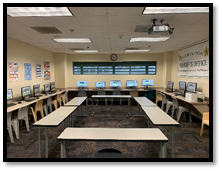
VOCATIONAL PROGRAMS
Vocational Resource Center (VRC): The VRC is a resource center located within MCSO, that provides access to resume building, employment workshops, job opportunities and other vocational resources for job seekers.
Working Smart: Participants are enrolled in a 5 module, 16-lesson curriculum that enhances job-seeker skills such as self-awareness, self-management, work ethics, communication and problem-solving skills. This certification provides participants with soft skills for workplace success.
Digital Literacy: The computer workshop introduces the basics and introductory skills needed for participants to become comfortable with accessing and using computer programs and the internet. Participants are taught the basic components of a computer, internet search engines, internet security and a host of other critical skills. Participants of this program receive a free laptop upon successful completion.
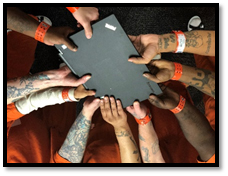
| Employment Readiness: A one-week program that prepares re-entry participants in planning for career readiness and advancement. Through assessments, participants learn about different careers and their areas of interests and skill sets. Participants also complete resumes and learn about the application and interviewing process.
|
| Horticulture Program: The horticulture program provides participants with learned skills to work in greenhouse operations, aquaponics, hydroponics and use of landscape and garden products to grow flowers, plants, fruits and vegetables. |
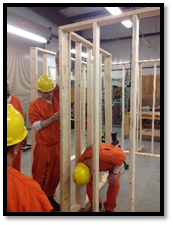
NCCER: National Center for Construction and Research (NCCER) is an industry-recognized credential that provides students and craft professionals with national portability of skills. Students receive Core Curriculum and Electrical 1 certifications through an accredited trainer.
Servsafe and Culinary Apprentice Certificate: Participants may obtain food and beverage safety training approved by the National Restaurant Association and receive a 5-year certification to enhance career opportunities in the food service industry. Residents learn the basic methods and practices of an entry level kitchen position. Upon successful completion, residents earn a Culinary Apprentice Certificate.
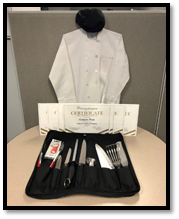

Library Assistant Vocational Training Class: A 20-hour vocational training class for Library Assistants. Participants who successfully complete the program may have an opportunity to work in the library as assistants where they handle the circulation of leisure reading materials in the detention center. Participants acquire skills that are useful when seeking employment after incarceration.
These programs are available to all adult residents as an opportunity to address various life circumstances that may have caused them to come into conflict with the law.
Adult Basic Education (ABE)Program: This program is available to participants who do not meet the GED minimum requirement of a ninth-grade education when provided an educational assessment.
High School Equivalency Test (HISET)/GED Program: Education classes are offered to adults who wish to obtain their high school diploma or the equivalent.
English as a Second Language (ESL): ESL classes are offered to individuals who are limited English proficient and provides instruction in learning the English Language.
Personal tutoring: Individual or small group tutoring may be available to those who need any type of basic instruction (reading, writing, etc.).
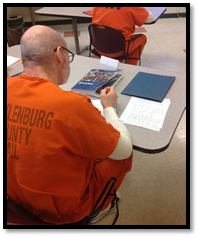
These programs are available to all adult residents as an opportunity to address various life circumstances that may have caused them to come into conflict with the law.
Commitment to Change: is a one-week program designed to address criminogenic risk factors leading to arrest, detention, and rearrests. This is an evidence-based curriculum that focuses on the successful application of cognitive behavioral theory (CBT). Participants consider how their thinking has impacted their lives and how to harness this reality into life change.
Life Skills: Participants are taught to accept responsibility for their behavior and to take deliberate steps toward change. Through understanding of the Perception Control Theory, participants acquire knowledge on how to handle personal relationships, money management, emotional regulation, anger management, job readiness, and pre-release planning. Classes taught include Creating Your Be Print, Strengthening Your Relationships, Transformational Life skills, and Strengthening Your Practices.
Domestic Violence: A one-week program where participants explore an evidenced-based curriculum, Growing Up Male®, about how violence starts in men’s lives where they hold pain inside and turn anger into violence. This curriculum also explores how women are targets of male violence and learn tools on how they can get help with their traumas of physical, emotional, and sexual abuse.
Anger Management: a two-week psycho-therapeutic program for anger prevention and control where participants learn how to reduce both emotional and psychological responses to anger. This program provides participants with information on anger and the necessary tools to recognize, diffuse, and control anger before it results in negative behavior.
Manhood: A two-week program where participants learn about the truths of being a man. Participants create a blueprint and devise a definition of what Manhood is, in order to gain an ability to write or re-write their stories.
Spanish speaking residents are offered programs which are culturally sensitive. Programs are facilitated by bilingual staff of Adult Programs.
Domestic Violence Education: Spanish-speaking participants receive basic information of domestic violence, cultural factors that influence domestic violence, the legal ramifications, and the impact of domestic violence on family dynamics.
Effective Communication: Participants learn the characteristics and processes of interpersonal communication including perception, non-verbal behaviors, listening, feedback, conflict recognition and resolution.
Life Skills: In-depth classes are offered to participants who are taught to accept responsibility for their behavior and to take deliberate steps toward change.
Parenting: This evidence-based program is offered to participants and provides them with the opportunity to reflect on their past interactions, with their children, and how to improve their relationships with family members and children in the future.
Substance use Education: Spanish-speaking participants have an opportunity to gain information on substance use to include personal, cultural, and environmental factors that influence substance use and creates awareness of the effect substance use has on individuals, families, and communities.
Thinking Errors: a class designed to help Spanish-speaking participants recognize errors with their thinking. The class helps participants better understand the various thinking errors that may be keeping them from freedom and success in life.
Substance Use Program: Participants are screened and accepted into a 42-day evidence-based Substance use treatment program. A certificate is awarded upon satisfactory completion of the program.
STD Education: Participants are provided firsthand knowledge and awareness of STD/Syphilis and HIV education. The program provides early intervention through education and testing of STD’s. The program also provides counseling and treatment of STDs for the participants.
Law Library: Residents can submit requests for law library services where they can access legal and case law information. Information may be sent to residents by mail or by scheduled appointment to come to the library to access Lexis Nexis, a computer software that contains legal and case law information.
Domestic Violence Awareness Class for Women: This mandatory introductory class educates and empowers women about Domestic Violence. Through education and counseling, female participants learn about the effects of domestic violence and acquire resources that are available as they transition back into the community.
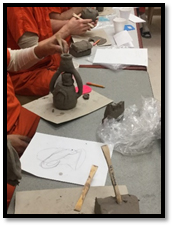
MCSO Modern Art Program: Participants are provided a one-week hands-on art workshop working with paint or clay. Some of the artwork that is created by the participants from the program are displayed at one of the local museums.
